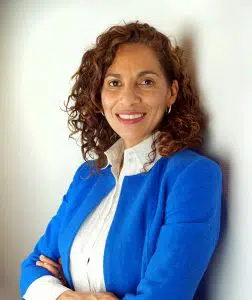“It is essential to define scenarios and develop predictive models to prevent and mitigate the effects of climate change”
The event began with an introduction by the British Ambassador to Spain, Hugh Elliott. He emphasized the very close ties between Spain and the UK on the subject of climate change, and specifically in the area of finance, which “we believe is a very opportune time for this event.”
 As part of the event, Mónica Zuleta explained that “in the insurance industry we are fully committed to the United Nations Sustainable Development Goals and the Paris Agreement, and of course the new ambitions and proposals coming out of COP26.” She added that insurance companies “have an advantage, because we act as investors as well as insurers. We help protect society, and we are increasing our contribution to societal change, towards a model of sustainable development.”
As part of the event, Mónica Zuleta explained that “in the insurance industry we are fully committed to the United Nations Sustainable Development Goals and the Paris Agreement, and of course the new ambitions and proposals coming out of COP26.” She added that insurance companies “have an advantage, because we act as investors as well as insurers. We help protect society, and we are increasing our contribution to societal change, towards a model of sustainable development.”
She added that, “one of the ways we can have an influence is by providing information. Studies on climate change have made it possible to develop new analytical tools and models. These have in turn been implemented to generate predictive scenarios and models, and these give us not only a better capacity to recover and keep our plans moving forward once a disaster has passed (such as in the case of the La Palma volcanic eruption), they allow us to collect information that can be used to prevent and mitigate changes being brought about by the climate.”
On the subject of investment, she noted that “we need to ensure that resources are being mobilized and that they are being analyzed using sustainability-based criteria. We now have initiatives focused on decarbonizing both the investment portfolio and the underwriting portfolio, and we are engaging in this process along with our customers.” In this context, in addition to the example she cited of Spanish electricity company Iberdrola, she believes that MAPFRE also has a responsibility to provide assistance with the energy transition process for economic actors in developing countries, such as in Latin America.
Looking towards the future, she explained that in addition to mobilizing resources to support the energy transition, it is important to make progress “towards sustainable mobility, and not just with investment, but with the actions of society as a whole, by making changes to our transportation models in a way that provides incentives for everyone to use more sustainable systems”. In this case, she uses MAPFRE’s Center for Experimentation and Road Safety (CESVIMAP) as an example. Finally, and still looking towards the future, she referenced the ongoing need for social development because the pandemic “has caused a setback in terms of the 2030 Agenda goals related to equality and poverty.”
The discussion was led by Juan Carlos Delrieu, Director of Strategy and Sustainability for the Spanish Banking Association, with other participants including Ana Puente, Assistant General Director of Legislation on Securities Markets and Financial Instruments from Spain’s Ministry of Economic Affairs and Digital Transformation; Severiano Solana, Director of Sustainability Strategy and Monitoring at CaixaBank; and Marta García de Oteiza, Senior Manager of the Responsible Banking Department at Santander.

